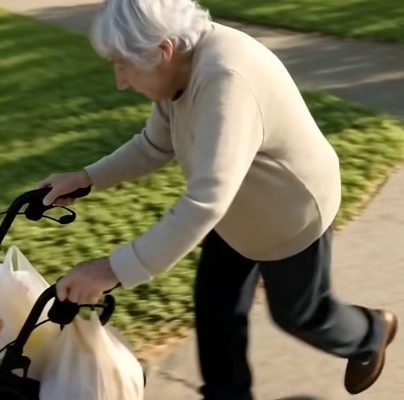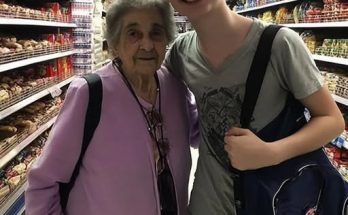It was almost 5 p.m. when I saw her inching down the sidewalk, the wheels of her walker squeaking with every step. Two grocery bags dangled off the handles—one with a loaf of bread and a few cans, the other with something warm packed in takeout containers wrapped in a towel. She didn’t see me watching from across the street. She was focused, determined, like this little stretch of pavement was a mission she had no intention of failing.
I’d seen her before—Miss Inez. Lived three doors down, always kept her curtains open and waved at the mailman like it was a formal appointment. But today, she was different. Tired, maybe. Breathing hard. Still, she didn’t stop.
When I finally crossed over and asked if she needed help, she waved me off gently.
“I’m alright,” she said. “Just bringing something hot to the Mitchell boy. His mama’s sick, and he’s been home alone three nights now.”
She adjusted the towel-wrapped bag and kept walking.
“I know what it’s like,” she added softly. “To feel forgotten.”
That’s when I noticed the taped-up letter on top of the container. Her handwriting, shaky but clear. And just two words on the front: “You matter.”
She made it to the Mitchells’ porch just as the sun dipped low behind the row of sycamores. I stayed back, not wanting to intrude, but I saw the moment the door creaked open and little Marcus peeked out. Eleven, maybe twelve. Hair uncombed, shirt wrinkled. Eyes hollow in a way no kid’s eyes should ever be.
Miss Inez smiled like she hadn’t just hobbled half a mile with arthritis and a heart that wasn’t quite what it used to be.
“I brought supper, baby,” she said, holding out the bag. “And a note, just for you. You open it after you eat, alright?”
Marcus took the bag like it was something sacred. Then, to my surprise, he stepped forward and wrapped his arms around her. She froze for a second—like hugs weren’t something she got much of anymore—then leaned in gently, resting her cheek against his head.
I don’t know what hit me harder: the hug, or the way she whispered, “You ain’t alone, you hear me? Not while I’m still breathing.”
The next morning, I brought Miss Inez some tea and biscuits. She let me in, her living room smelling faintly of lavender and old wood. A single photograph sat on her mantle—her husband, from decades ago, dressed in his Sunday best, holding a baby girl.
“My daughter passed in ’97,” she said quietly when she saw me looking. “Car wreck. And my Henry… he followed the year after. Said his heart just couldn’t keep up no more.”
I nodded, not knowing what to say.
She stirred her tea slowly. “People stopped knocking after a while. Church folk meant well, but time moves fast for the living. You get old, and you become… background. Furniture.”
She wasn’t bitter. Just honest.
“But that boy,” she continued, “Marcus… he reminds me of my grandson. Haven’t seen him in six years. His mama moved away after the funeral. Never gave me her new number.”
She sighed and set her spoon down.
“Some people just need to know someone sees them. That’s all.”
A few days later, something unexpected happened. Marcus knocked on her door. His shirt was tucked in, hair brushed, and he held a paper in his hand. It was a drawing—crayon, rough but sweet. It was of her, pushing her rollator, with a cape on her back.
“I drew you as a hero,” he said shyly. “’Cause you saved me that night.”
She stared at the drawing, hand trembling. Then she did something I hadn’t seen her do before—she cried. Not the quiet, polite kind of tears. But full, aching sobs.
Later, I found out why.
Turns out, Marcus had been more than just lonely. The Mitchells had fallen on really hard times. His mom, Sheila, was battling late-stage breast cancer, and she hadn’t told anyone outside of work. Her pride, maybe. Her fear. But she collapsed that night—two days after Miss Inez’s visit—and was rushed to the hospital.
And that note? “You matter”? Marcus had taped it to his wall, right above his bed. Said it kept him from doing something terrible that night. Said he’d been thinking about running away—maybe even worse—but her kindness hit him like a hand grabbing him back from the edge.
When the news of Sheila’s illness got around, the neighborhood came alive like it hadn’t in years. Meals were organized. A fundraiser was set up by the local hardware store. People who hadn’t talked in months started showing up with casseroles and spare change.
And Miss Inez? She became the unlikely heart of it all.
Three weeks later, Marcus rang my bell.
“Miss Inez fainted,” he said, panicked. “She’s on the porch!”
I ran. Fast as I could. Found her slumped against the side rail, lips pale, breathing shallow.
She spent three nights in the hospital. Congestive heart failure. Doctor said the walk that day probably pushed her more than she let on. When she woke up, her first question wasn’t about herself.
“How’s Marcus?”
We started taking turns sitting with her. Marcus insisted on doing her grocery runs. He even figured out how to fix her old squeaky walker wheel—said it was the least he could do.
Then came a twist none of us saw coming.
One afternoon, a woman knocked on Miss Inez’s door. Middle-aged, nervous. Holding a manila folder.
“I’m Dana,” she said. “Your daughter… your daughter was my mother. She got pregnant young. Gave me up at birth. I only found out recently… I think you’re my grandmother.”
Miss Inez didn’t speak for a long time. She just stared.
Then she said, quietly, “Come in, baby. Let me get you something warm.”
The weeks that followed were full of laughter and food and photo albums that hadn’t been opened in years. Dana and Marcus became fast friends. Sheila, undergoing treatment but stable, finally let the neighborhood help her. And every time someone asked where all this started, someone always pointed to Miss Inez’s soup.
It wasn’t fancy soup. Just chicken and noodles with too much pepper and a sprig of thyme.
But it carried love. And sometimes, love is all it takes to turn a corner, to start healing, to save a life.
Moral of the Story:
You don’t need to be strong, wealthy, or young to change someone’s world. Sometimes, a small act of kindness—a hot meal, a handwritten note, a squeaky-wheeled walk—can light up the darkest places in someone’s life.
Miss Inez didn’t have much. But she had heart. And that was enough.
So the next time you feel too small to matter—remember her. And if you can, be someone’s “You matter” today.
❤️
If this story moved you, share it with someone who might need a little hope. And don’t forget to like this post—it helps more people see that kindness is still alive in this world.



